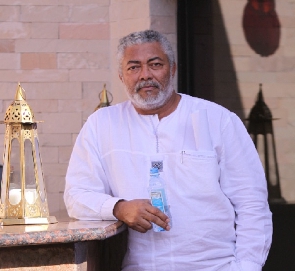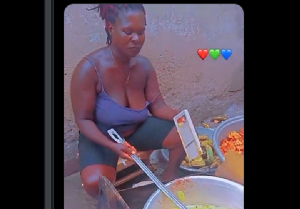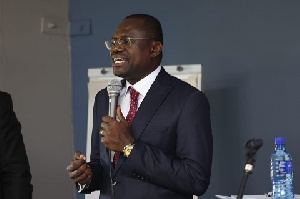The story is told, that in their desperate attempts to lustrate the country of the so-called unbridled sleazes and corruption, the founders of the NDC ravenously elbowed their way through Ghana’s political scene via a series of vicious coup d’états, ruled despotically for eleven years and then formed the National Democratic Congress (NDC).
Despot Rawlings and his disciples unblushingly proselytized and brainwashed many unsuspecting Ghanaians into believing that the people they deposed emptied the national coffers with unabashed disgust and that the only way forward was to purge the country of the perceived injustices.
Consequently, Rawlings and his cohorts carried out what they termed a “house cleaning exercise”. Rawlings and his conspiratorial plotters however went ahead and dealt with the perceived offenders arbitrarily.
Rawlings and his cabal regrettably tortured and killed innocent people, many of whom were accused of legitimately borrowing meager sums of money from banks to support their businesses.
As a matter of fact, Rawlings and his NDC apologists kept trumpeting their perceived ethos-probity, transparency, and accountability to the annoyance of their political opponents.
Dearest reader, isn’t it therefore ironic that the same people, who somehow claim to appall sleazes and corruption and have therefore made probity, transparency, and accountability their prime mantra, would later cause the collapse of Ghana’s economy through wanton sleazes and gargantuan corruption?
There is no gainsaying the fact that Rawlings and his rabble-rousers supplanted power at the time when Ghana’s economy was blossoming steadily in 1981.
Indeed, Dr Hilla Limann and his PNP government were hitting the ground running and therefore there was no need for anybody to disturb the ambiance.
The Limann government assumed office at a time when the economy was in deep crisis. The credit lines to the country had almost dried up and were blocked due to brutalities and confiscations at the harbors and other points of entry into Ghana by the coup-making founders of the NDC.
However, the story is told, somewhat poignantly, that through careful negotiations, preparations, and the implementation of pragmatic policies and programmes, the Limann government managed to arrest the economic challenges.
More importantly, commendable efforts were made to repay Ghana’s short-term debts, and, the Limann government demonstrated the ability to meet Ghana’s debt obligations.
Consequently, Dr. Limann’s government managed within 18 months and restored virtually all traditional credit lines (Source: PNC).
But despite all the dint of efforts, Rawlings and his cohorts did not give Dr. Liman and his PNP government the breathing space to govern the country, as they relentlessly breathed down the neck of President Limann.
Rawlings and his coup-making minions unfairly kept castigating Dr. Limann’s administration for what the conspiratorial plotters perceived as economic mismanagement, until Rawlings and his jailbreaking geezers decided to depose Dr Limann.
Subsequently, Rawlings and the other mutinous jailbreakers took arms and succeeded in usurping the democratically elected government of Dr. Hilla Limann on 31st December 1981.
We cannot deny or ignore the fact that all over the world, prudent and pragmatic administrations, more often than not, manage to improve upon the economic fortunes of their respective countries if they are allowed to stay in power a bit longer.
Take, for example, in Rwanda, the officeholder is elected by popular vote every seven years, in turn, appoints the Prime Minister and all other members of the Cabinet.
Suffice it to emphasize that the Rwandan current president, Paul Kagame, has been in power since 2000 and has managed to transform the country’s economy.
In fact, Rwanda has undergone rapid industrialization largely due to the implementation of pragmatic policies and programmes over a sustained period of time.
In Malaysia, Mahathir Mohamad, who returned in 2018 as the head of the opposition coalition, and the oldest Prime Minister at 93 years old, stabilized the Malaysian economy from 1981 to 2003.
Tun M, as Mahathir is called by his supporters, oversaw a period of rapid economic growth and development in Malaysia during his first long stint in office.
In the United Kingdom for example, the Labour Party assumed power from 1997 to 2010 under two separate Prime Ministers, Tony Blair from 1997 to 2007 and James Gordon Brown from 2007 to 2010.
Suffice it to stress that Blair and Brown did their utmost best and managed to stabilize the UK’s economy until the Labour Party lost power to the Conservative Party in 2010.
That being said, to every rule, there is an exception, and this is no different in the case of Ghana.
Regrettably, in Ghana, since the attainment of independence from the British on 6th March 1957, the NDC tradition (PNDC and NDC) had governed the country more than any other government one can think of. In fact, that tradition had governed Ghana for approximately 27 years out of Ghana’s 66 years with little to show for it.
If we go down memory lane when the late President J. J. Rawlings completed his 96 months of democratic rule on 7th January 2001, he packed up as directed by Ghana’s 1992 Constitution. Thus, the stage was set for other qualified people to take over the presidency.
Even though quite an impressive number of political parties presented their formidable candidates to compete for the important position, the race for the next president was keenly contested between the NDC candidate, the late John Evans Atta Mills, and the NPP candidate, John Agyekum Kufuor.
It must, however, be mentioned that the 2000 election traveled into the second round and John Agyekum Kufuor emerged victorious on 28 December 2000.
The ebullient President John Agyekum Kufuor then took over the presidency from the late President J. J. Rawlings on 7th January 2001.
President Kufuor regrettably had a tough time in office initially as there were not many funds left in the national purse to plan anything meaningful.
Disappointingly, the late President J. J. Rawlings’s total rule of 228 months (military, 132 months and democratic, 96 months) administrations only managed to destabilize Ghana’s macroeconomic indicators.
The late Rawlings’s administration indeed adopted a seemingly calamitous Economic Recovery Programme (ERP), which was introduced under the auspices of the World Bank and the International Monetary Fund (IMF).
The vast majority of tangible national assets, including the state-owned enterprises were allegedly sold to friends and families for pittance.
The apparent unfavorable Economic Recovery Programme culminated in a catalog of hardships. And, on top of the harsh programmes and policies which threatened the economic fundamentals, the population had to brace itself for food shortages, a situation which was comparable to the concurrent Ethiopian famine that resulted in millions of deaths.
Perhaps more than anything else, the initiation of the Programme of Action to Mitigate the Social Costs of Adjustment (PAMSCAD) did not improve the unfortunate situation as untold hardships permeated many households.
Starvation, so to speak, visited the vast majority of Ghanaians, and as a result, developed hideous collar bones which the humorous Ghanaians renamed as “Rawlings Chain”. That was indeed the pernicious extent of the hunger.
Ghana was then declared a Highly Indebted Poor Country (HIPC). The fact of the matter is that the newly elected President Kufuor had a tough decision to make, by either embracing or rejecting the HIPC status.
However, the forward-thinking President Kufuor chose to swallow a bitter pill with a view to getting over the malaise. He thus pragmatically embraced the HIPC status in 2001.
As a matter of fact and observation, the benefits of the HIPC were unprecedented during former President Kufuor’s administration, from (2001-2008).
The fact of the matter is that macroeconomic indicators began to stabilize and Ghana’s debt stock was significantly reduced by about $4 billion within that period (BOG 2009).
In addition, as a result of the HIPC initiative and prudent borrowing, Ghana’s external debt stock actually declined from $6.1 billion in 2000 to$3.8 billion by 2008 (BOG 2009). It was an “unprecedented” achievement, so to speak.
It is also worth pointing out that the average GDP growth of the NDC from 1993-2000 was 3.8% while that of the NPP from 2001-2008 was 5.2% with economic growth reaching 6.3% in 2007 (GSS 2008).
As was expected, former President Kufuor successfully completed his first term in office (four years), having managed studiously to stabilize the macroeconomic indicators.
Subsequently, the good people of Ghana handed him the mandate for another four-year term following a keenly contested presidential election on 7th December 2004.
President Kufuor exerted dint of critical thinking, worked strenuously for eight solid years, laid an auspicious economic foundation, and retired honorably. He then passed on the baton to the late President Mills on 7th January 2009, following his victory in the second round election on 28 December 2008.
Opinions of Friday, 23 June 2023
Columnist: Kwaku Badu















